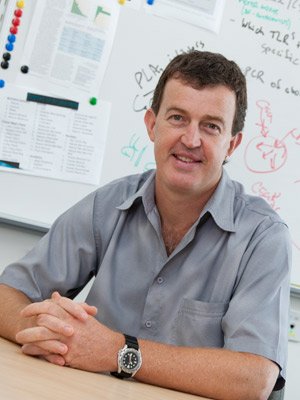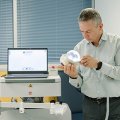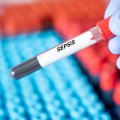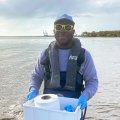
Researchers have developed a new method for rapidly measuring the level of antibiotic molecules in the blood and how they work against bacteria, paving the way for personalised treatments for bacterial diseases.
The researchers, including Professor Matt Cooper from The University of Queensland, used nano-sized levers as sensors to measure the concentration of active antibiotics in blood.
“Some of our most effective antibiotics are like termites eating away at the walls of a wooden house – they attack bacterial cell walls so they eventually collapse,” said Professor Cooper, from UQ’s Institute for Molecular Bioscience.
“But competing molecules in the blood can bind to antibiotics and prevent them from working, meaning there are less molecules free to exert force on bacterial cell walls.
“The sensor we developed, one billionth of a metre in size, can detect the bending that occurs in a cell wall when it is assaulted by antibiotics.
“This enables us to measure how many antibiotic molecules are free in the blood to attack bacteria and treat the infection based upon how much force they exert onto the wall.”
The amount of free antibiotics in the blood will vary between people, meaning this method could be used to determine the best antibiotic dosages for different individuals and different infections.
“Understanding the way antibiotics use physical force against bacteria could also provide researchers with a new angle on the design of better drugs to fight superbugs, which often have thicker, stronger cell walls,” Professor Cooper said.
The researchers tested the method on two antibiotics: vancomycin, used to treat multi-drug resistant infections such as Methicillin-resistant Staphylococcus aureus, and oritavacin, a new antibiotic still in clinical trials designed to combat bacteria that are resistant to vancomycin.
Details of the method were published overnight in scientific journal Nature Nanotechnology in a study led by Dr Joseph Ndieyira from the London Centre for Nanotechnology (LCN) at University College London.
It also involved researchers from the University of Cambridge, UK, and Jomo Kenyatta University of Agriculture and Technology in Kenya.
Professor Cooper acknowledged support from an Australia Fellowship from the National Health and Medical Research Council.
To make a tax-deductible donation to IMB superbug research, visit www.imb.uq.edu.au/donate or call +61 (07) 3346 2134.
To discuss commercial opportunities associated with this research, contact Dr Mark Ashton on m.ashton@uniquest.com.au or +61 (07) 3346 2186.
The Institute for Molecular Bioscience (IMB) is a research institute of The University of Queensland that aims to improve quality of life by advancing medical genomics, drug discovery and biotechnology.
Media: IMB Communications Manager Bronwyn Adams, 0418 575 247, 07 3346 2134, b.adams@imb.uq.edu.au.












